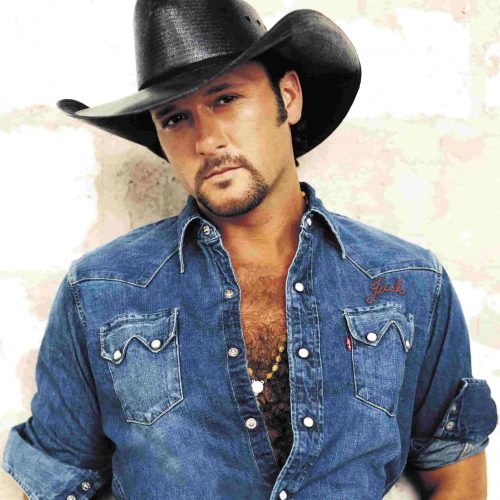Home - Artists - $750,000 + - Tim McGraw
Book Tim McGraw

Imagine Tim McGraw Headlining Your Event!
The staff of Headline Booking Group will work with you to produce a flawless and memorable event. Get started now by filling out our no-obligation Artist Request Form.
Biography
Tim McGraw Biography
⭐ Tim McGraw
Genre: Country | Country Pop | Southern Rock
Booking Category: Headline Country Artist / Grammy Award-Winning Performer
🎤 About Tim McGraw
Tim McGraw is a country music icon whose unmistakable voice, heartfelt lyrics, and charismatic stage presence have made him one of the most celebrated performers in modern American music. With a career spanning over three decades, McGraw has released 16 studio albums, sold over 80 million records worldwide, and earned three Grammy Awards, 14 Academy of Country Music Awards, and 11 Country Music Association Awards.
Hailing from Louisiana, McGraw burst onto the scene in the early '90s with hits that blended traditional country roots with contemporary flair. He’s known not just for his solo success, but also for his powerful duets with his wife and fellow superstar Faith Hill.
Beyond his music career, Tim is a respected actor and philanthropist, having appeared in hit films such as The Blind Side and Friday Night Lights, and launched the Tim McGraw Foundation to support various causes.
🎶 Top Songs by Tim McGraw
-
Live Like You Were Dying
-
Humble and Kind
-
Don't Take the Girl
-
I Like It, I Love It
-
My Best Friend
-
Highway Don’t Care (with Taylor Swift & Keith Urban)
-
Something Like That
-
It's Your Love (feat. Faith Hill)
-
Shotgun Rider
-
Just to See You Smile
📺 Watch Tim McGraw Perform
-
Live Like You Were Dying – Watch on YouTube
-
Humble and Kind – Watch on YouTube
🎧 Listen on Spotify
🌟 Why Book Tim McGraw?
With his legendary catalog, crowd-pleasing performances, and enduring influence in the world of country music, Tim McGraw is a headliner guaranteed to elevate any event. Whether it's a private gala, festival, or major corporate event, his emotional connection with fans and professional polish make him an unforgettable choice.
⭐ Tim McGraw
Genre: Country | Country Pop | Southern Rock
Booking Category: Headline Country Artist / Grammy Award-Winning Performer
🎤 About Tim McGraw
Tim McGraw is a country music icon whose unmistakable voice, heartfelt lyrics, and charismatic stage presence have made him one of the most celebrated performers in modern American music. With a career spanning over three decades, McGraw has released 16 studio albums, sold over 80 million records worldwide, and earned three Grammy Awards, 14 Academy of Country Music Awards, and 11 Country Music Association Awards.
Hailing from Louisiana, McGraw burst onto the scene in the early ’90s with hits that blended traditional country roots with contemporary flair. He’s known not just for his solo success, but also for his powerful duets with his wife and fellow superstar Faith Hill.
Beyond his music career, Tim is a respected actor and philanthropist, having appeared in hit films such as The Blind Side and Friday Night Lights, and launched the Tim McGraw Foundation to support various causes.
🎶 Top Songs by Tim McGraw
-
Live Like You Were Dying
-
Humble and Kind
-
Don’t Take the Girl
-
I Like It, I Love It
-
My Best Friend
-
Highway Don’t Care (with Taylor Swift & Keith Urban)
-
Something Like That
-
It’s Your Love (feat. Faith Hill)
-
Shotgun Rider
-
Just to See You Smile
📺 Watch Tim McGraw Perform
-
Live Like You Were Dying – Watch on YouTube
-
Humble and Kind – Watch on YouTube
🎧 Listen on Spotify
🌟 Why Book Tim McGraw?
With his legendary catalog, crowd-pleasing performances, and enduring influence in the world of country music, Tim McGraw is a headliner guaranteed to elevate any event. Whether it’s a private gala, festival, or major corporate event, his emotional connection with fans and professional polish make him an unforgettable choice.
Expand Full Bio
Samuel Timothy McGraw was born in Delhi, LA, on May 1, 1967. He was raised mostly in the small town of Start, LA, near Monroe, and grew up listening to a variety of music: country, pop, rock, and R&B. He attended Northeast Louisiana University on a baseball scholarship, studying sports medicine, and it was only then that he started playing guitar to accompany his singing. He played the local club circuit and dropped out of school in 1989, heading to Nashville. He sang in Nashville clubs for a couple of years and landed a deal with Curb in 1992. His debut single, the minor hit 'Welcome to the Club,' was released later that year, and his self-titled debut album appeared in 1993 but failed to even make the charts.
McGraw's fortunes changed with the lead single from his 1994 sophomore effort, Not a Moment Too Soon. 'Indian Outlaw' was embraced as a light-hearted, old-fashioned novelty song by fans but was heavily criticized for what some regarded as patronizing caricatures of Native Americans. Despite some radio stations' refusal to air the song, it reached the country Top Ten and even crossed over to the pop Top 20. All the publicity helped send McGraw's next single, the ballad 'Don't Take the Girl,' all the way to the top of the country charts; it too made the pop Top 20. The album kept spinning off hits: 'Down on the Farm' hit number two, the title track went to number one in 1995, and the novelty tune 'Refried Dreams' also reached the Top Five. Not a Moment Too Soon was a genuine blockbuster hit, eventually selling over five million copies and topping both the country and pop album charts; it was also the best-selling country album of the year.
McGraw's follow-up, 1995's All I Want, immediately consolidated his stardom with the number one smash 'I Like It, I Love It.' The album topped the country charts, reached the pop Top Five, and sold over two million copies. Once again, it functioned as a hit factory thanks to the number two 'Can't Be Really Gone,' the number one 'She Never Lets It Go to Her Heart,' and the Top Five 'All I Want Is a Life' and 'Maybe We Should Just Sleep on It.' McGraw's next album, 1997's Everywhere, become another crossover smash; it topped the country charts, fell one spot short of doing the same on the pop side, and sold four million copies. The lead single was a McGraw-Hill duet called 'It's Your Love,' which not only hit number one country, but made the pop Top Ten. Three more singles from the album -- 'Everywhere,' 'Where the Green Grass Grows,' and 'Just to See You Smile' -- hit number one, and two others -- 'One of These Days' and 'For a Little While' -- reached number two. Meanwhile, 'Just to Hear You Say That You Love Me,' another husband-and-wife duet from Hill's 1998 album Faith, climbed into the Top Five.
McGraw kept topping the charts. His next album, 1999's triple-platinum A Place in the Sun, hit number one country and pop, and four of its singles also hit number one: 'Please Remember Me' (which featured Patty Loveless), 'Something Like That,' 'My Best Friend,' and 'My Next Thirty Years.' 2000 brought McGraw's first Greatest Hits compilation, a best-selling smash, and another Top Ten duet from Hill's Breathe album, 'Let's Make Love.' The song later won McGraw his first Grammy, for Best Country Vocal Collaboration.
Released in 2001, Set This Circus Down (number one country, number two pop) kept McGraw's hit streak going into the new millennium, giving him four more number ones -- 'Grown Men Don't Cry,' 'Angry All the Time,' 'The Cowboy in Me,' and 'Unbroken' -- just like that. In 2002, his duet with prot_g_e Jo Dee Messina, 'Bring on the Rain,' also went to number one. For the follow-up album, McGraw defied country convention by entering the studio not with session musicians, but with his road band, the Dancehall Doctors, a unit that had been together since 1996 (with some members around even before that). Tim McGraw was released in late 2002 and produced Top Ten hits in 'Red Rag Top' and 'She's My Kind of Rain'; it also featured a startlingly faithful cover of Elton John's 'Tiny Dancer.' McGraw kept the formula the same on 2004's chart-topping Live Like You Were Dying, utilizing his road band, as well as co-mixing/producing the record himself. Let It Go followed in 2007, with Southern Voice arriving in 2009.
Samuel Timothy McGraw was born in Delhi, LA, on May 1, 1967. He was raised mostly in the small town of Start, LA, near Monroe, and grew up listening to a variety of music: country, pop, rock, and R&B. He attended Northeast Louisiana University on a baseball scholarship, studying sports medicine, and it was only then that he started playing guitar to accompany his singing. He played the local club circuit and dropped out of school in 1989, heading to Nashville. He sang in Nashville clubs for a couple of years and landed a deal with Curb in 1992. His debut single, the minor hit ‘Welcome to the Club,’ was released later that year, and his self-titled debut album appeared in 1993 but failed to even make the charts.
McGraw’s fortunes changed with the lead single from his 1994 sophomore effort, Not a Moment Too Soon. ‘Indian Outlaw’ was embraced as a light-hearted, old-fashioned novelty song by fans but was heavily criticized for what some regarded as patronizing caricatures of Native Americans. Despite some radio stations’ refusal to air the song, it reached the country Top Ten and even crossed over to the pop Top 20. All the publicity helped send McGraw’s next single, the ballad ‘Don’t Take the Girl,’ all the way to the top of the country charts; it too made the pop Top 20. The album kept spinning off hits: ‘Down on the Farm’ hit number two, the title track went to number one in 1995, and the novelty tune ‘Refried Dreams’ also reached the Top Five. Not a Moment Too Soon was a genuine blockbuster hit, eventually selling over five million copies and topping both the country and pop album charts; it was also the best-selling country album of the year.
McGraw’s follow-up, 1995’s All I Want, immediately consolidated his stardom with the number one smash ‘I Like It, I Love It.’ The album topped the country charts, reached the pop Top Five, and sold over two million copies. Once again, it functioned as a hit factory thanks to the number two ‘Can’t Be Really Gone,’ the number one ‘She Never Lets It Go to Her Heart,’ and the Top Five ‘All I Want Is a Life’ and ‘Maybe We Should Just Sleep on It.’ McGraw’s next album, 1997’s Everywhere, become another crossover smash; it topped the country charts, fell one spot short of doing the same on the pop side, and sold four million copies. The lead single was a McGraw-Hill duet called ‘It’s Your Love,’ which not only hit number one country, but made the pop Top Ten. Three more singles from the album — ‘Everywhere,’ ‘Where the Green Grass Grows,’ and ‘Just to See You Smile’ — hit number one, and two others — ‘One of These Days’ and ‘For a Little While’ — reached number two. Meanwhile, ‘Just to Hear You Say That You Love Me,’ another husband-and-wife duet from Hill’s 1998 album Faith, climbed into the Top Five.
McGraw kept topping the charts. His next album, 1999’s triple-platinum A Place in the Sun, hit number one country and pop, and four of its singles also hit number one: ‘Please Remember Me’ (which featured Patty Loveless), ‘Something Like That,’ ‘My Best Friend,’ and ‘My Next Thirty Years.’ 2000 brought McGraw’s first Greatest Hits compilation, a best-selling smash, and another Top Ten duet from Hill’s Breathe album, ‘Let’s Make Love.’ The song later won McGraw his first Grammy, for Best Country Vocal Collaboration.
Released in 2001, Set This Circus Down (number one country, number two pop) kept McGraw’s hit streak going into the new millennium, giving him four more number ones — ‘Grown Men Don’t Cry,’ ‘Angry All the Time,’ ‘The Cowboy in Me,’ and ‘Unbroken’ — just like that. In 2002, his duet with prot_g_e Jo Dee Messina, ‘Bring on the Rain,’ also went to number one. For the follow-up album, McGraw defied country convention by entering the studio not with session musicians, but with his road band, the Dancehall Doctors, a unit that had been together since 1996 (with some members around even before that). Tim McGraw was released in late 2002 and produced Top Ten hits in ‘Red Rag Top’ and ‘She’s My Kind of Rain’; it also featured a startlingly faithful cover of Elton John’s ‘Tiny Dancer.’ McGraw kept the formula the same on 2004’s chart-topping Live Like You Were Dying, utilizing his road band, as well as co-mixing/producing the record himself. Let It Go followed in 2007, with Southern Voice arriving in 2009.
Tim McGraw Booking Request Form
Please fill out the form below. One of our booking agents will contact you within 24 hours to discuss your event in greater detail.
Our Services Include

Comprehensive needs assessment

Contacting and negotiating with celebrity talent representation


Serving as a liaison between your staff and the artist ensuring a flawless performance

You also might like

Country

Country

Country

Country

Country

Country

Country

Country

Country

Country
The Headline Booking Promise
At Headline Booking, we deliver unforgettable celebrity entertainment performances for private parties that create lasting impressions and lifelong memories. Our promise is a Gold Standard of service, so you can relax and enjoy the show while trusting that every detail will be executed flawlessly. When you choose Headline Booking, we provide:
Booking of your favorite A-list artist to perform at your private event
Contracting with the artist and coordination of all Artist travel logistics
Our staff to advance all details with you specific to your event
A professional on-site production team overseeing all concert details delivering a seamless experience to be enjoyed by all
